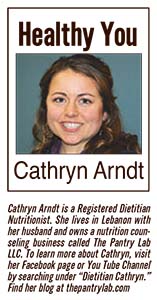We have turned the corner! 2021 is (finally!) here!
If you haven’t read last month’s article regarding several encouragements to make healthy changes going into the new year, then you may find yourself scrambling and stressed as you gear up for making or implementing your health goals for the new year.
Here is the problem with much of the New Year “resolution-ing” that goes on: People view it as though they are picking the diet they are going to date for the next three to six months. “What is the right diet for me? How do I get healthy? Vegan, keto, paleo, flexitarian etc. How to choose?! There are too many options!” It can create a lot of unnecessary current stress and future guilt.
I believe two things contribute to this food stress and overwhelm. Two unnecessary ways of thinking leave us either indecisive, over-dogmatic, or discouraged – or all of the above.
The first problem is that we fall into the trap of “diet identity.” This is when we make changes to our eating habits (often ascribing to a certain “diet”) and then proceed to define ourselves by our food choices. We realize that in order for our changes to work, we must incorporate it into our lifestyle. “Lifestyle diets” is very “in” presently.
Vegan and keto are probably the top ones currently that purport that they are a way of life and not just a way of eating. On one hand, this makes a lot of sense. This is because the reality is the most significant changes are made when they are adopted completely and with consistency. When something is part of your lifestyle, you do it regularly. It shapes your decisions and the patterns of your choices.
There is nothing wrong with making changes that affect your life. The problem is when a “diet identity” creeps in and you define yourself by it. You begin to say and believe “this is what or how I eat and this is who I am. I am a ….Vegan, Keto, Paleo, gluten-free person,” etc.
I think part of the reason we get to this place is because we want (and need) a measure of support and affirmation as we change. Having support and like-minded friends isn’t bad but finding your whole-person affiliation with your food choices isn’t good.
This mindset creates lines of definition between groups of people and gives a false sense of value. It makes room for only one way of ideal eating and puts people in camps of “you eat this way and I eat that way.” This mindset can make a person overly-sensitive, dis-unifying in their attitudes towards others and inflexible in their mindset.
This mindset isn’t realistic with how life works which is dynamic and ever-changing. Pigeon-holing yourself (or others ) into a certain type of eater may lead to a dis-service to your health as time goes by.
This actually leads us to the second problem that promotes food stress during the new year: having an inflexible view of food. What do I mean by that? It is the view that a strict, particular way of eating is “the way” for you at all times. It is a little bit of an “all-or-nothing” approach.
The truth is, since when is life stagnant? What other area in your life do you expect to be fixed? Relationships, jobs, skills, dreams, physical health – none of those remain the same throughout your life. So why do we think that our diets should look the same forever and that there is a rigid “one-size-fits-all-at-all-times” approach?
What may have served you at one season of life may not in another. Digestion and hormones change, as do physical demands and activity. Conception, birth, lactation and just being a mom also place specific demands on the body. Let your ideas of what will nourish you ( and your family) be flexible. Let it grow and change. It’s not about yo-yoing. It’s simply making smart, appropriate adjustments.
You can see where an inflexible mindset, paired with defining yourself by your food diet, can get complicated. Maybe you discovered keto and you identified yourself that way for a time. You dropped weight, slept better and felt amazing.
Then things started to shift. You realized that the lack of fiber and vitamins from slashing the fruits and veggies were taking a toll on your digestion and nutrient status. You start to rethink your food and yet that prospect feels too scary. How can you change when you have developed a community and lifestyle around keto?
That might seem like an extreme example but it shows that when we get stuck in the identity trap we are not able to make the necessary changes to our food habits without some difficulty.
I suggest that you rethink this. Please give yourself permission to acknowledge that certain foods or eating styles that served you at one time may not at another. Do note that this isn’t promoting yo-yo dieting. When you have a solid nutritional foundations, this flexible view of food actually won’t lead to yo-yo dieting.
But what is a solid nutrition foundation, you ask? The foundation is whole, unprocessed foods. This is always best.
Being flexible with good nutrition may mean that you need to include more carbohydrates (from whole foods) into your meals or to taper your carbohydrates during the day because you find yourself more sedentary. You may need to boost your fat intake or drop it a little bit. etc. All of these changes ought to occur around whole, minimally processed foods.
Carbohydrates, fats and proteins, fiber and vitamins are all found in whole foods (especially plant foods). That is what our bodies need, yet those specific detailed needs will shift and look different at various times of your life.
Going meatless might serve you for a time. Things might change and you decide to include animal products. You may find certain veggies tear up your stomach and must be avoided for a spell or you need to avoid foods with certain fibers. Your life and body, money and energy will shift and change and your diet should too.
That is 100% OK (if you haven’t attached too much to the way you eat).
Rather than ascribing to a certain “diet lifestyle,” try ascribing to real, unprocessed foods. Start there. Whatever you do, avoid the temptation to make your food choices your identity or a fixed state that you can never modify.
Step into the New Year with fresh, unfettered resolve to make nourishing changes and/or stick to the ones you have already developed. Do it without defining yourself by your food choices and keeping a flexible view of food.
– Cathryn Arndt is a Registered Dietitian Nutritionist (RDN) who owns a nutrition counseling business called The Pantry Lab LLC. She lives in Lebanon with her husband and daughters. Find her at thepantrylab.com or visit her Facebook page by searching under “Dietitian Cathryn.”





